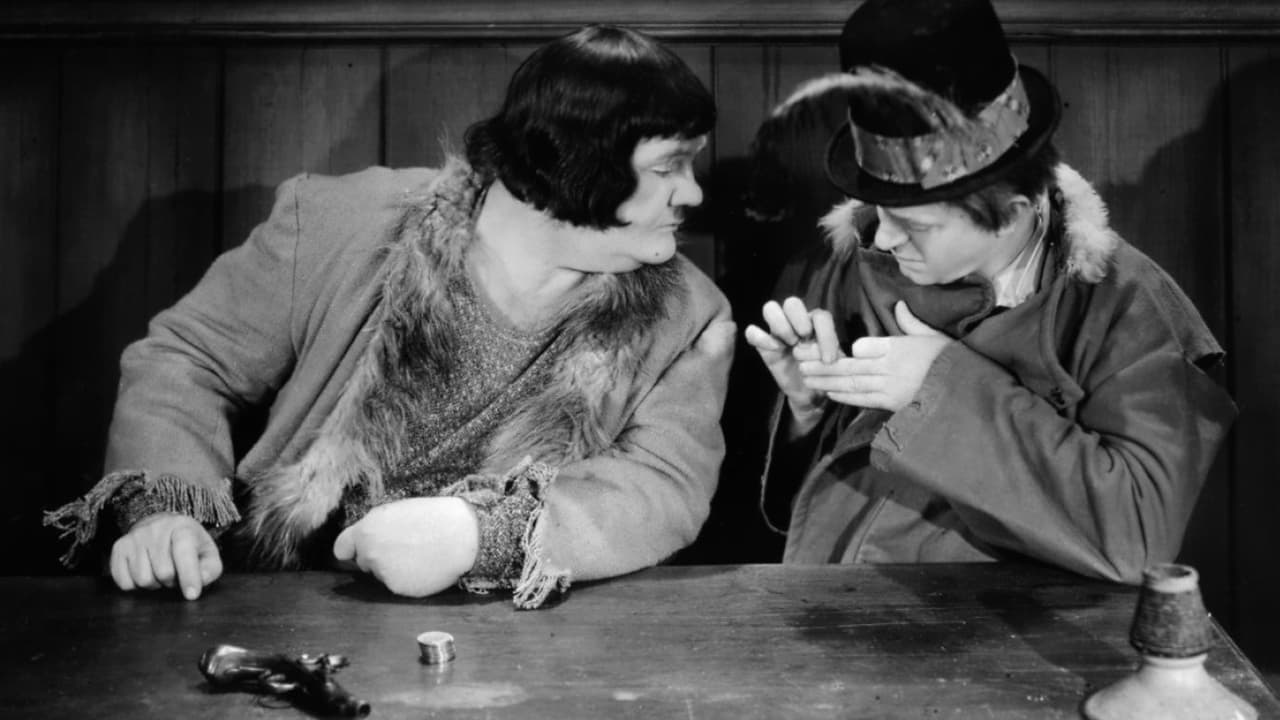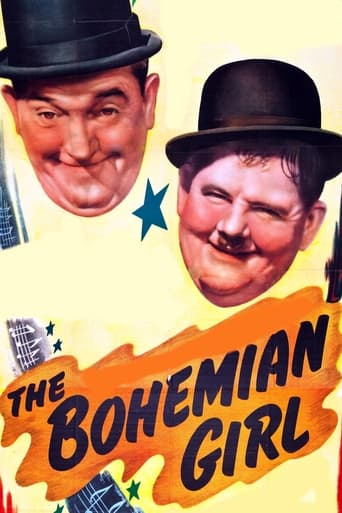


This movie is the proof that the world is becoming a sick and dumb place
... View MorePurely Joyful Movie!
... View MoreThis movie was so-so. It had it's moments, but wasn't the greatest.
... View MoreI am only giving this movie a 1 for the great cast, though I can't imagine what any of them were thinking. This movie was horrible
... View MoreHave been a fan of the Boys for decades but had missed this one until a new TV channel specialising in "film history"/Goldie Oldies launched a L&H season and gave me the opportunity to view this one. Never again! Every single one of the "gypsy" scenes could have been omitted with no loss whatsoever (archaic/dated/tiresome drivel now but I cannot really believe that people paying to see this at the local cinema in 1936 would have found these scenes anything other than trite, poorly performed kitsch. The "songs" are only memorable for being worse than the one just before - no memorable melodies, delivered by third rate singers trying to compensate for their lack of singing ability by lots of eye work, hand clasping and upward gazing (probably asking (like me), "How much longer do I have to endure this?") I would love to say that the bits without the dreadful gypsy scenes are then pure gold, but I cannot. There are some quite nasty sides to this picture (child abduction (and therewith, of course, centuries of anti-Romany prejudice/hatred coming through), adultery (and Oliver's hen-pecked husband routine just comes across as simply disturbing/alarming in the way it is played here) plus what seems a little too much enthusiasm for flagellation (including (potentially) of a young woman towards the end!) and the very final scenes of torture being inflicted to raise a (very cheap) laugh at the very end). The portrayal of the Boys as conscious, deliberate thieves/pick pockets also jarred ill with me as one of their key features was always that of innocence/naivety which is retained here overall but cannot be squared with their resolution to set off and deliberately separate people from their belongings (again some anti-Romany feelings creeping in?) Even taking this out, however, and just leaving the Boys on their own and creating havoc, the film STILL has little to offer! Stan's routine of filling wine bottles towards the end is just awful, lacking in timing, innovation and simply flat, I found. Most of the other sketches are fairly flat as well and, overall, I must say that this is probably THE L&H picture which caused me to laugh least of all the ones I have seen (although I believe there are still some stinkers for me to live through in the coming season ("Swiss Miss" from what I have heard?) I believe the Boys were pretty useless when it came to money and were totally ripped off by Hal Roach and others, meaning they did not earn a penny when their films were shown (in black and white) on American TV in the 1950s (where, of course, they were adored and helped to win a whole new generation of fans of their work) and it would seem they were also sometimes pretty useless at choosing which films to appear in as well (and this one should certainly have been left to second-/third-raters from whom one would not expect anything better, like Abbott and Costello or The Three Stooges). Still, I am at least grateful that for every "The Bohemian Girl" there is a "Way out West" and "Sons of the Desert" and that, overall, the gold far outweighs the drivel/dross.
... View MoreHollywood could never make this movie today in this way. The Laurel and Hardy scenes, and they are funny, are simply inserted between scene of a very sincere, if corny, production of Balfe's then still popular Bohemian Girl. It never occurs to the director to make fun of this folk opera, which must have taken real restraint, as it is at its best quite corny and could easily have been made fun of. But Roach doesn't. When Eileen sings the big number, "I dreamt that I dwelt in marble halls," the focus is on her and nothing ridicules what was then still a popular number in pops concerts.That's what fascinated me about this picture. Yes, as with the Marx Brothers'A Night at the Opera those with no interest in opera or its performance history will see the operatic scenes as just annoying filler. But for those of us who do have an interest in such things, it's very interesting to see that there was a time when Hollywood could present opera, even not very good opera, in a sincere and straightforward fashion, relying on the audience to enjoy those segments for what they were.Yes, this is another example of Laurel and Hardy, and an enjoyable one. But it is also a sort of document of how a certain type of opera was once performed and appreciated, and that is not negligible.
... View MoreBohemian Girl, The (1936) *** (out of 4) Laurel and Hardy end up taking care of a six year old girl not knowing she's really a princess. This isn't the best L&H feature out there but there's enough smiles and laughs to make it worth viewing once. I doubt I'd ever watch this one again but the potato scene with Laurel is hilarious as is the wine drinking scene. The film really picks up towards the end. Thelma Todd's final film.Fixer-Uppers, The (1935) *** (out of 4) Laurel and Hardy are card salesmen who meet a woman who feels neglected by her husband. In order to make her husband jealous Hardy agrees to play the part of her lover but when the husband catches them he challenges Hardy to a duel. Several hysterical scenes are here including the kiss between the woman and Laurel and another wonderful segment involving a drunk who makes matters even worse.
... View MoreTwo gentle eccentrics raise THE BOHEMIAN GIRL kidnapped by gypsies, unaware of her noble birth.In evaluating this film it is important to understand that it is very different from the result first planned by Hal Roach. The mysterious and scandalous death (murder? suicide? accident?) of the leading lady late in 1935 caused extensive reshooting & reediting by the nervous Studio. Although Thelma Todd is still given third place billing, her participation has been slashed down to virtual insignificance. What a waste. This was the lovely & talented Miss Todd's final film, she was a credit to herprofession and she deserved better treatment. This probably also accounts for the abrupt cuts & scene transitions which plague the production.As a result, Felix Knight's obvious role as romantic lead was also truncated and he is left with but one short appearance, singing a melodic ballad. This is also a shame, as he was a fine young actor and he never received another good chance to become a successful movie star.The main attractions, Stan Laurel & Oliver Hardy, never falter. They are hilarious even when sitting and doing nothing. Playing puckish pickpockets, they get to involve themselves in a fair amount of physical activity, which gives the viewer another opportunity to marvel at Stan's inventiveness and Ollie's remarkable grace & dexterity. Stan's latest finger trick and his attempt to siphon a barrel of wine into bottles, along with Ollie divesting a foppish nobleman of every last valuable accouterment, stand out, but only as gems among treasures.Two of the great character actors from the Boys' films of the past appear with them again. Formidable Mae Busch, making her final appearance with Stan & Ollie, plays Hardy's spectacularly unfaithful wife and suspicious little James Finalyson comes in at the end as an officious captain of the guard.OUR GANG cutie Darla Hood is darling indeed as the purloined infant. She grows up to become pretty Jacqueline Wells (an obvious replacement for Miss Todd). Former matinée idol Antonio Moreno plays Miss Busch's paramour, while elderly English actress Zeffie Tilbury brings life to the small part of the Gypsy Queen.Irish prodigy Michael William Balfe (1808-1870) composed the 1843 operetta upon which the film is based. Many of the words of the songs, especially when performed by the Gypsy Chorus, are unintelligible. However, it is good to hear the wonderful old solo ballads "When Other Lips" & "I Dreamt That I Dwelt In Marble Halls" beautifully sung.
... View More